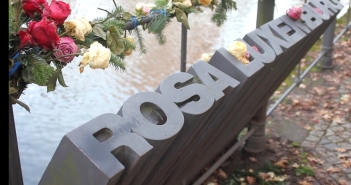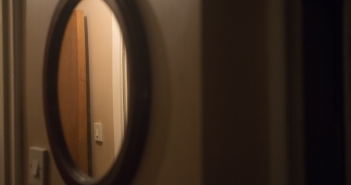Inspired by Michel Houllebecq’s novel Atomised (1998), Ben Pantrey considers the endurance of the Christian idea of the apocalypse in contemporary debates. Note: This article contains plot spoilers for Atomised!
Atomic Particles
Last week, I was in the magazine office, where I picked up a copy of Michel Houllebecq’s book Interventions 2020, which is a collection of short essays. I was instantly struck by the humour, the choice of topics, and the easy-to-read-but-thoughtful analysis of contemporary society. I was shocked.
“I thought Houllebecq’s books were all about whining about women and immigrants.” I said to the magazine editor.
“No, of course not. He’s a great writer.” he replied.
A few days later, I started reading Atomised.
That book is also extremely readable. In fact it’s the most engaging book I’ve read by a living author. His description of modern life, and the meaningless existence elevated to an ideal in our society, is right on point. The situations he depicts are funny, grotesque, or just plain depressing, but he never wallows. There is a good balance between ideas and plot.
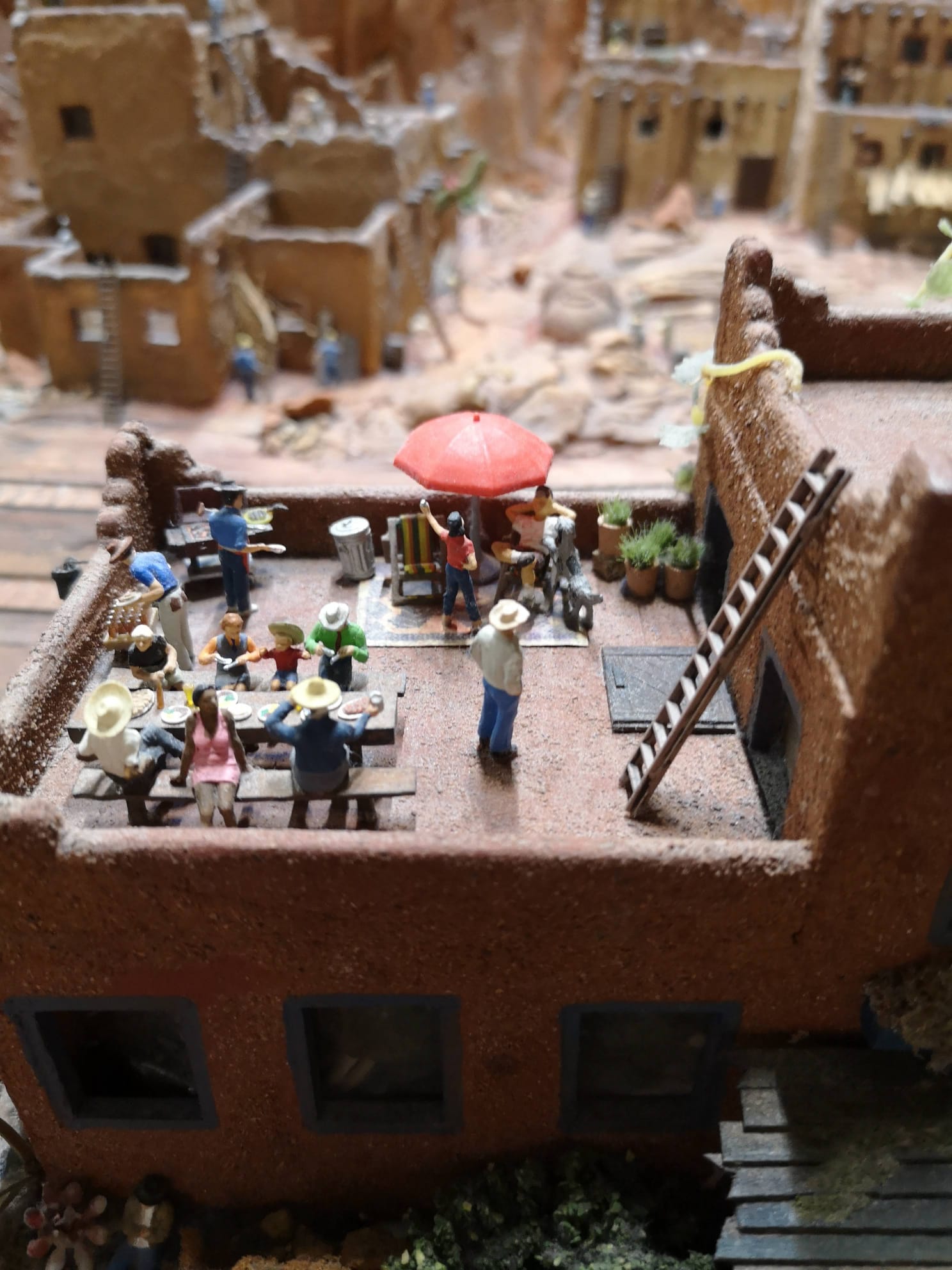
Miniatur Wunderland.
Miniatur Wunderland
More than anything, I was struck by how Houellebeca’s vision matched an idea that had been pressing upon me for some time. In January 2020, I visited Hamburg, and went to an exhibition called the ‘Miniatur Wunderland’.
It was a building with floor upon floor of model railways in different settings: famous cities, woodlands, desserts, mountains and so on. A miniature model of Hamburg itself was there, with its red light street, the Reeperbahn, where model women posed in red-lit windows, and model men with beer bellies gathered.
Although constructed from wood, acrylic, steel and plaster, this world was a moving world. Trains and trams shuttled to and fro, aeroplanes took off, and ambulances raced through intersections with their blue lights flashing. I was amazed by the amount of detail that went into this work. They were like Brueghel paintings, with little stories and humorous incidents everywhere you looked: a man falling off a ladder; a love affair; a protest.
It didn’t happen immediately, but as the years passed, the vision of life suggested by the Miniatur Wunderland wormed its way into my thinking. Standing in the street, I would start wondering how it would look if I was staring down from the sky. How would I perceive the world if I had nothing at stake? If all I was bringing to bear on it was my own curiosity?
The downside of comparing the world to a model is that it makes everything seem flat and mechanistic. It denies the one real truth of life – subjectivity – and puts in its place a deterministic universe, full of cause-and-effect situations and atoms endlessly shuttling to and fro. There is no space for inner truth, no space for change. Only matter in a void. A big round ball of Being.
But, since the age of Lucretius this has been exactly the view underpinning the development of scientific thought, and worked out in capitalist economics. Atomistic, materialistic, deterministic. One apple is equivalent to another. Through the medium of money, the variety and uniqueness of physical reality is squashed into a flat virtuality.
One day Banzan was walking through a market. He overheard a customer say to the butcher, “Give me the best piece of meat you have.” “Everything in my shop is the best,” replied the butcher. “You cannot find any piece of meat that is not the best.” At these words, Banzan was enlightened. (Zen Koan)
The notion of a commodity with a fixed price (your used copy of a book is worth the same as another person’s used copy of a book in the same condition) ignores the sentimental value of an object.
‘Sentimental value’, by which we deem everything that belongs to the domain of actual lived and meaningful experience, is excluded from the reckonings of the marketplace. All the worse, then, that our entire society has become a marketplace, where individuals compete for status: monetary, cultural and sexual. It is this last arena that most fascinates Houellebecq.
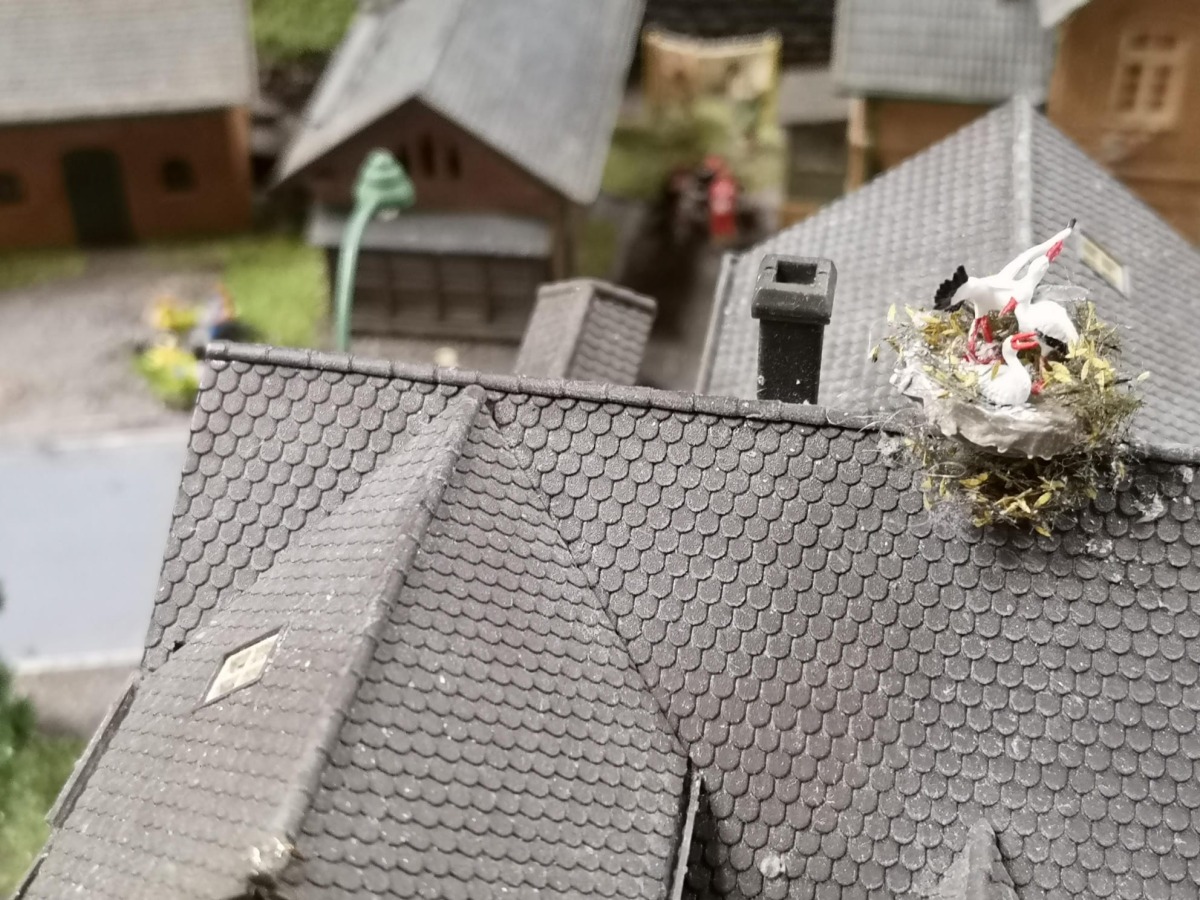
Miniatur Wunderland.
Love is an anomaly…
In Atomised, Houellebecq satirises the dominant ideological model of society, exposing it as spiritually barren, dominated by selfishness, exploitation and ruthless competition in every sphere of life. Love is an anomaly, and quickly snuffed out in a cold world.
The novel loosely follows the story of two brothers: Michel and Bruno. Their parents are divorced, and they grew up with very different childhoods.
Michel was fascinated by the natural world, and in his adolescence met by chance with a beautiful girl who loved him in an almost spiritual way, but was met by coldness on his side.
Bruno, meanwhile, was bullied mercilessly, had no success with girls, and cared more for literature.
In their adult life, their paths diverge widely. Michel has no desire for life, he drifts onwards, pulled only by his own curiosity to understand the world scientifically. He ignores romantic opportunities, and eventually commits suicide after putting his scientific insights down on paper.
Bruno, meanwhile, is a sex addict. He pursues sex relentlessly, seeking a validation that no experience can ever provide. No matter the sexual pleasure, or how many orgies he participates in or taboos he breaks, he cannot develop a sense of wholeness. He is always frustrated. This frustration is expressed in his misogynistic and racist articles that nobody wants to publish.
There isn’t a plot, per se. The main interest lies in the various hijinks Bruno gets up to, and in the bits of social commentary Houellebecq the narrator includes along the way. When describing the protagonists’ father attending school, for examples, the narrator says:
“Martin’s teacher was keenly aware that there was more to his job than spoon-feeding elementary facts and figures to every untrained citizen. His task was to seek out the qualities that allowed a child to join the elite…” (p. 18)
Here, Houellebecq is able to bring social critique into his narrative quite effectively, posing provocative interpretations of the role of schooling to the reader. In general, novels act as great mediums for this. The all-knowing tone typical of a novel’s narration, and the fact that they are consumed in private, allows for a direct, and didactic engagement with the minds of readers. The length allows the author to present a totalising view of life all in one go, unlike an article that can only sketch at a perspective.
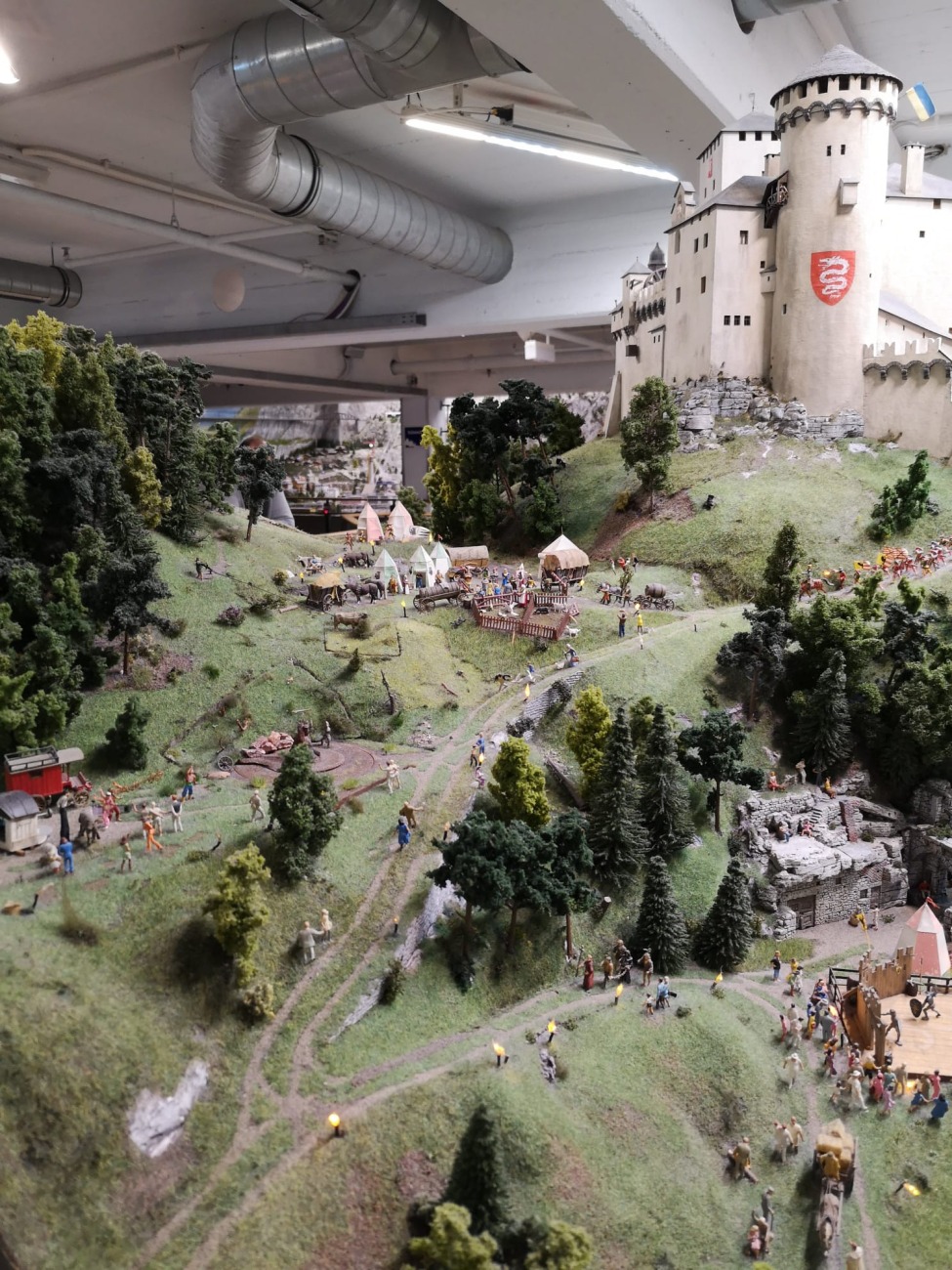
Miniatur Wunderland.
New Age Society
The most damning portrayal of contemporary society arrives in a part of the novel where Bruno attends a festival-cum-self-help-weekend. Houellebecq’s description of the activities at this event could be seen as a a damning assessment of New Age Society as a whole:
“All around him human beings were living, breathing, striving for pleasure or trying to develop their personal potential. On every floor, human beings were improving, or trying to improve, their social, sexual or professional skills or find their place within the cosmos.” (p. 100)
Obviously, Houellebecq is not impressed.
The prime example of Houllebecq’s critique of this self-help 60s-influenced culture is in Michel and Bruno’s mother, who abandons her children in favour of an endless quest of self-discovery and spiritual development.
Atomised is a bitter and satirical portrait of the modern world where only isolated instances of illogical love redeem a landscape that is otherwise cold, selfish, brutal and crude. Death haunts every moment, with the decaying of our bodies, the shocking cruelties of fate, and our obsession with sex: the one means of delaying the extinction of the species.
It’s definitely a cynical point of view that Houellebecq promotes, but it’s hard to argue against, and really isn’t so different to that expressed in such popular fiction as The Hunger Games (Suzanne Collins, 2008). Here, too, society is depicted as a ruthless arena of competition. A zero-sum game where those in the lower rungs of society desperately vie to join the elite in a viciously enforced hierarchy.
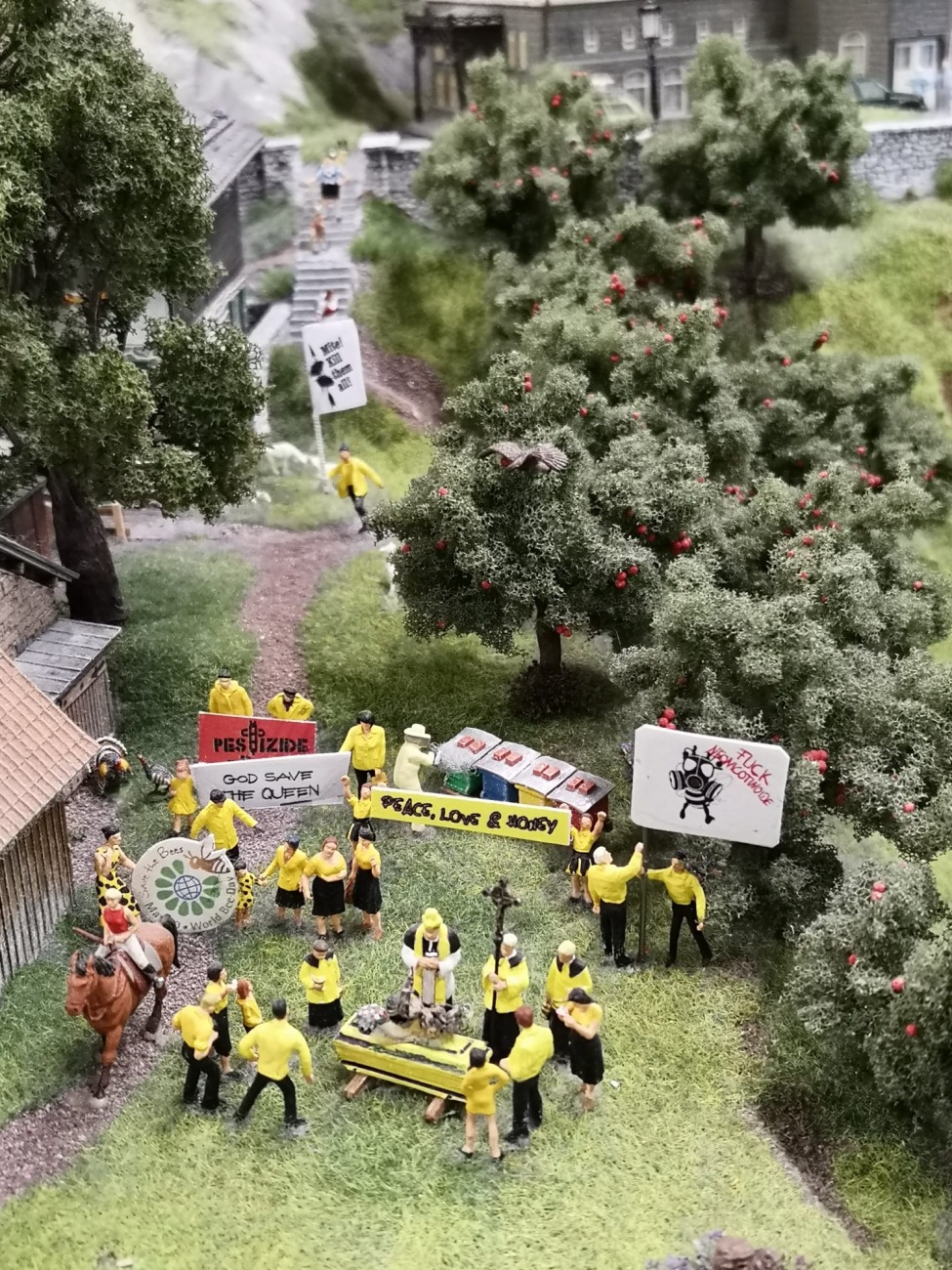
Miniatur Wunderland.
Sci-fi Twist
The final pages of Atomised turns the book on its head, adding an unexpected sci-fi twist. Michel, who has spent his life devoid of romance, devises a way to allow humans to propagate without the need for sex.
It will all be done in a lab from now on, as with Dolly the sheep, and this lab-based reproduction will allow for genetic modification to create healthier humans that won’t develop crippling conditions like cancer, dementia, cystic fibrosis etc.
In hindsight, our age of sexual competition, desperate consumerism, and widespread anxiety and paranoia seem rather laughable and superficial. Everything will be settled in peace by a race of sexless, immortal post-humans.
What do we make of the idea that we are at the cusp of a vast historical shift? The start of a new Millennium, paired with vast strides in technological innovation, certainly put this idea in many people’s minds. This apocalyptic notion manifested first as a fear of the Y2K bug – that computers worldwide would crash at the start of the new Millennium due to dating difficulties, wreaking havoc in the world of finance, medicine and transport.
Next, there was murmuring over the date 2012, the end of the Mayan calendar, after the Western calendar had ceased to be a problem. This, of course, passed without a hitch. Now we project our apocalyptic fears onto the climate, or on advancements in AI.
Terence McKenna introduced the doomsday date of 2012 into mass culture. He was vague about what exactly would happen, but believed it would be something new and unexpected. His listeners, high on the drug of Christianity, took this to mean apocalypse.
Shows like Charlie Brooker’s ‘Black Mirror’ explore the idea of human minds being uploaded into virtual reality when our bodies expire, where we can live in an Eden of our own construction. Is this what Christians meant when they thought of history as a long journey starting and ending in paradise?
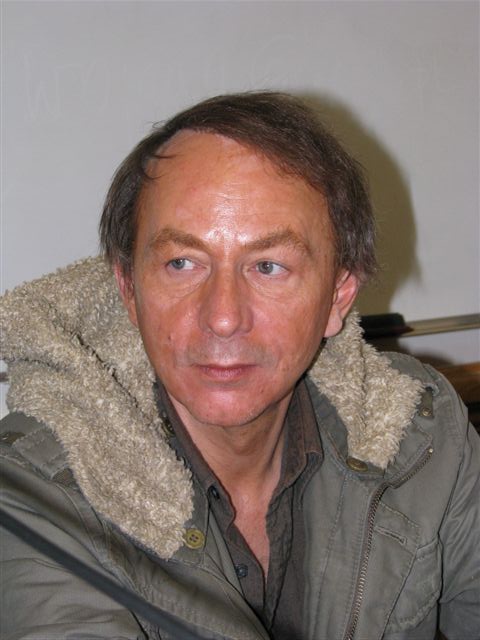
Michel Houellebecq in 2008.
Edenic State
The paradisal state of Eden is that of ignorance: paradise was lost once humanity became self-conscious. In our hedonistic pursuits, I wonder, do we strive for that same unselfconsciousness we have lost?
It is clear that we see our faculty of reason as something of a curse, even if it does bring us closer to the state of angels. Gnostics lament that nature didn’t bring us one step closer: let us keep our psyche, but free ourselves from the physical body. Let us be like angels!
With this context, we see how Western science has really been a gnostic dream, with the destruction of physical reality (ecological collapse) and the ascension to pure spirit (cyberspace) its logical goal. We haven’t reached this impasse by accident, but by design.
Only by recognising and consciously rejecting the gnostic message can we take control of our situation. That involves acceptance of the body, and a rebellion against the tyranny of the mind.
Am I calling for a plunge into the irrational? After the horrors of the twentieth century, Western man has an understandable fear of the irrational. But remember it was distorted Reason that led to the horrors propagated under Stalin’s Russia and Hitler’s Germany.
No ‘primitive’ society could have arranged the Holocaust. No, this horror was the dark face of civilisation and a perverse ‘rationality‘. The ‘greater good’: the cold inhumanity of reason. This is what comes of rejecting emotion and feeling, of being out of touch with the messages of the body, our one tangible link with Nature.
Although we call ourselves a secular society, Christianity still lurks in the shadows of our thinking. Take, for instance, the apocalyptic tone that inevitably attends discussions around climate change or Artificial Intelligence. World leaders packed two by two in Bezos’s Ark. A just reward for our sins. Mr Beast healing the sick. It’s all a bit hellfire and brimstone.
I’m not saying these areas won’t pose issues in the future, but I think it’s concerning that we always think in black and white: either it’s business as usual or it’s the apocalypse. This blindsides us from acting and reacting in the face of more subtle forms of change. This is, after all, the most likely result of our ecological challenge: the Earth will become slowly more inhospitable. Can we train our eyes on this without jumping to hyperbole?
This obsession with apocalypse is of course a remnant of Christianity. For Christians, history is linear and has a clear end point: the Day of Judgement, or the Return of Christ. Everything we do until then is fleeting, and only relevant insofar as it affects the judgement that will be meted out to us (unless you’re a Calvinist, in which case there is no relevance whatsoever to these happenings on Earth).
Christianity has the concept of an End of History built into it, in contrast to cultures that see time as cyclical, just like the seasons of a year or the passing of generations.
The end of history, or civilisation, does not mean the end of life on this planet, nor even human life necessarily. But it does mean the end of “progress” as we have previously considered it. Our buildings will not always grow taller. Our phones will not always become more sophisticated. Our food will not get more processed. Is that so bad? To live closer to the Earth and to one another?
For Houellebecq, the end of history means the end of sex as a means of reproduction. And this he considers a form of liberation. The Buddha would agree. He said all desire is suffering. Yet, there’s such a thing as enjoyable suffering. What kind of music would Houellebecq’s post-humans make?
Another day ends. Throughout the building, lights are flicked off. Conversations slow to a light murmuring, and then drop off completely. At what cost will we keep living in Wunderland?
Feature Image: Miniatur Wunderland


